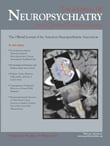To the Editor: Pathological gambling is defined by the DSM-IV-TR as a clinical condition characterized by persistent and maladaptive gambling behaviors; these are severe enough to disrupt the patient’s life and relationships and are not due to a manic episode.
1 Based on gambling behavior phenomenology, comorbid psychiatric conditions, family history, and demographics, it has been proposed that pathological gambling can present in three clinical subtypes: impulsive, obsessive-compulsive, and addictive.
2 Pathological gambling has been reported in association with dopamine agonists used in Parkinson’s disease,
3 restless legs syndrome, and endocrine disorders. The European Union Pharmacovigilance Working Party recommends that summaries of product characteristics for dopamine agonists carry a warning about pathological gambling as a side effect.
To the best of our knowledge, there are currently no published reports of pathological gambling associated with modafinil, and there have been no Yellow Card reports submitted to the U.K. Commission on Human Medicines.
Case Report
Mr. C was referred to the neuropsychiatry clinic at the age of 39 with a 12-year history of narcolepsy (HLA-DBQ1*0602 positive) and associated cataplexy. He had no significant medical or psychiatric history and was being treated with modafinil, 300 mg daily in two divided doses. Initially there was a good response, but a developing tolerance prompted the referral. The patient had a prior history of minor gambling but reported a 10-fold increase in his slot-machine use, spending £20,000–£30,000 a year, since commencing modafinil. The patient was hesitant to increase the dose in case his gambling habit worsened.
It was decided to withhold modafinil for a 2-month trial. At the next review, the patient complained of increased somnolence without the medication but reported that his gambling habit had considerably decreased. His somnolence had necessitated restarting modafinil, and his gambling had increased once again. He was started on clomipramine, 50 mg at night, with a view to titrating up to 150 mg/day to alleviate his compulsive behavior.
Eighteen months later, he was taking clomipramine, 40 mg at night, and had discontinued modafinil. He reported that he was no longer gambling.
Discussion
Modafinil is currently licensed in the United Kingdom for the symptomatic relief of excessive sleepiness associated with narcolepsy, obstructive sleep apnea, and moderate to severe chronic shift-work sleep disorder. Its use is also under study for cocaine dependence and attention-deficit/hyperactivity disorder.
In this patient, we observed a clear-cut temporal relationship between modafinil treatment and a gambling habit, with an improvement after withdrawal and worsening on rechallenge. The precise mechanism of action of modafinil is still unclear.
4 Modafinil is thought to increase wakefulness by blocking dopamine clearance through inhibition of the dopamine transporter and has been shown to increase cortical and caudate dopamine concentrations.
5The effects of modafinil on impulsive/compulsive symptoms have been poorly investigated. A recent controlled study suggested that modafinil can have bidirectional effects on pathological gambling patients. Specifically, it has been shown to increase desire to gamble, disinhibition, and risky decision-making in low impulsivity subjects, while decreasing these indexes in high impulsivity subjects.
6 Overall, reward-seeking behavior, especially pathological gambling-compulsive/addictive subtype, may represent a possible adverse effect of modafinil via potentiation of the dopaminergic system in predisposed individuals.

